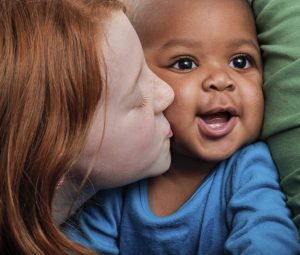Active attention to diversity is essential to the field of infant mental health (IMH) where self-awareness and relationships are the core of our work. However, in light of the current ambiguous political context that highlights our need to protect threats to civil rights, fight the continued oppression of people of color and continue to advocate for quality services for those in the most high-risk environments, we are under particular obligation to consider how to not only enhance our active attention but also our advocacy efforts.1 In addition, the IMH Code of Ethics states that the Michigan Association for Infant Mental Health (MI-AIMH) service provider “understands and respects the uniqueness of each individual with respect for ethnicity, culture, individuality and diversity in all aspects of infant and family practice.”2 This ethical standard, in conjunction with the IMH value regarding the “importance of relationships,”2 suggests that IMH professionals must be willing to engage in practices that challenge discrimination and the propagation of stereotypes, advocate for policies that support greater inclusion for all families and seek to expand the diversity of the IMH workforce to establish authentic, meaningful and transformative relationships with infants, toddlers and their families. Such an active stance requires a willingness to thoughtfully and critically examine our relationships with families and systems and the ways in which we may actively or passively contribute to the maintenance of pervasive social and economic inequities that so negatively impact families with young children. Understanding what diversity means in the context of IMH practice with families in Michigan and examining the meaning of diversity-informed practice as it relates to IMH provides a beginning foundation to further explore our shared commitment to healthy, safe and equitable environments for infants, toddlers, and families.
The families with whom IMH professionals in Michigan work today vary greatly in their expression of what makes up a “typical family.” Young children may be cared for by heterosexual or homosexual biological or foster parents, relatives, single parents or a home made up of many generations, all providing care together for the children. Families also vary in socioeconomic make-up, geographic location, racial and ethnic identification and the extent of legal and child welfare involvement. Moreover, the “identified client” to whom IMH professionals are assigned differs widely; this range is comprises pregnant mothers, infants, toddlers, preschoolers and children who are nearing school age.
The extent of the diverse ways in which families present themselves to IMH professionals necessitates that professionals continually examine their own thoughts about diversity and how their thoughts may assist or postpone the relationship and alliance building with the families they serve. The IMH professionals’ ongoing practice of evaluating their reflections about diversity will be challenged each time they meet with a family and engage in informal assessment specific to culture, including the ways in which they differ physically, culturally, spiritually, emotionally and cognitively from the families that they serve. As they take note of these differences, IMH professionals are encouraged to be responsive to those differences through sensitive discussions with the families and, when appropriate, conversations with reflective supervisors and consultants as well as documentation within assessments. We are hopeful that ongoing and careful informal assessment will lead to increased awareness and examination of the needs and challenges that exist in relation to differences between professionals and families. IMH professionals may find themselves wondering: How do I build a working alliance when I sense insecurity or mistrust from a family because of apparent differences (age, gender, race, etc.)? How do I respond when my growing self-awareness forces me to confront stereotypes to which I have perhaps consciously or unconsciously subscribed? How do I work within the IMH practice model when the intervention does not seem to address the family’s more pressing concerns that stem from cultural, racial and/or ethnic barriers such as fear of deportation? How can I best support a family who is geographically isolated and lives 2 hours away from their supports, including me?
In reviewing some of the current literature regarding diversity-informed IMH practice, the IMH Diversity-Informed Tenets stand out as a comprehensive articulation of the practices that should be infused in our work with infants and families to combat oppression and advocate for social justice. In 2012, the Irving Harris Foundation Professional Development Network created these tenets to serve as guiding principles for IMH practice under the premise that, “in order to create a just and equitable society for the infants and toddlers with whom its members work, the field must intentionally address some of the racial, ethnic, socioeconomic, and other inequities embedded in society.”3 These tenets promote diversity-informed practice rather than simply advocating cultural competence, which traditionally focuses on the providers’ knowledge and awareness of the cultural experiences of consumers.3 By contrast, diversity-informed practice extends beyond this one-dimensional, static view of culture and includes the transactional nature of relationship-based IMH work including “the influence of intersecting forces of oppression on provider-family relationships, on shaping research designs or on systems of care more broadly.”3
Diversity-informed practice requires the integration of IMH theories and interventions with focused attention on the unique experiences, needs, expectations, values and cultural identifications of the particular family. This integration may seem an obvious and matter-of-fact element of IMH practice as we have a history of highlighting the importance of understanding the unique contributions of an infant or toddler and their caregivers when working with a family. However, in diversity-informed practice, the integration is accompanied by the provider’s conscious awareness of the fact that, “family and care-giving structures have changed dramatically for all children over the 20th century and presumptions of shared experience are likely to cause difficulties, perhaps especially in families with whom one shares culture and language.”4 Paul Spicer suggests that a keen sense of self-awareness as well as a willingness to remain open to the diversity that exists in our work, including the diversity that exists within what may have been considered one cultural group, is essential to avoid culturally exclusionary practice. Spicer reminds us of our first and perhaps most important task in IMH work: “Here, then, the need to listen to the individuals in the room, and to understand their unique cultural experiences and priorities, needs to be the most important guidance.”4 Thus, listening to the words, tones, nonverbal cues, environment, history and ebb and flow of the relationship—while maintaining an understanding that there is much that remains to be known—provides the IMH worker an opportunity to engage with families with “a degree of humility about what may be in the best interests of the child and to continue to develop effective approaches to infant mental health for all children and families.”4
Another element of diversity-informed practice in IMH inevitably includes reflective supervision, a cornerstone of all IMH practice. Barbara Stroud describes the obligation of reflective supervisors to support their supervisees’ engagement with diversity in their IMH practice.5 Self-awareness and the capacity for reflection are competencies that are honed during reflective supervision, and these competencies necessitate an awareness of one’s own beliefs, values and cultural experiences as well as the diversity professionals will encounter in their work with families. The supervisory relationship itself becomes a model for the ways in which diversity can be discussed, understood and explored. According to Stroud, the power dynamics inherent in all supervisory relationships must be acknowledged in addition to the power dynamics that emerge based on inequities tied to race, ethnicity, class, gender, sexual orientation, religion and other points of identification. The meaning of such differences must be explored and supervisors are charged with “hold[ing] the emotional tension that is present when diversity issues are explored”5 and modeling the stance of authenticity, transparency and curiosity that supervisees can use with the families they serve.
The 2017 MI-AIMH Conference, “Integrating Mindfulness and Diversity in Practice: Nurturing Authentic Relationships with Infants, Young Children, and Families,” will examine diversity and the ways in which race, ethnicity, sexual orientation, geography, discipline, and other points of identity texture, enrich and challenge our mindful connections with families. In her keynote address, “Walking the Walk: Implementing Inclusion and Equity Principles in Early Childhood Programs With the Aid of the Diversity-Informed Infant Mental Health Tenets,” Kandace Thomas, MPP, will expand on our understanding of the Tenets and will offer us ways to incorporate them into our practice with infants, toddlers and their families. Keynote speaker, Marva Lewis, PhD, will also provide us with essential tools for our tool box through her keynote address, “Translating Culturally Valid Research into Evidenced-Based Community Interventions: Successful Steps Along the Nappy-Haired Road” by describing a research based intervention to support the relationships of infants and toddlers and families of color. We look forward to learning more about utilizing the Tenets with Kandace Thomas on May 8 and about new interventions for working with racially and ethnically diverse families from Dr. Lewis on May 9 at the 2017 Biennial MI-AIMH Conference in Kalamazoo.
We hope to see you there!
References
- National Association of Social Workers (November 9, 2016). NASW statement on Donald J. Trump as 45thS. President. www.naswdc.org/pressroom/2016/NASW%20Statement%20on%20Trump%20Election%20Final%20PDF.pdf. Accessed Feb. 8, 2017.
- Michigan Association for Infant Mental Health. Infant Mental Health Code of Ethics. http://mi-aimh.org/for-imh-professionals/infant-mental-health-code-of-ethics/. Accessed Feb. 8, 2017.
- John MS, Thomas K, Noroña CR (2012). Infant mental health professional development: Together in the struggle for social justice. Zero to Three. 2012; 33:13-22.
- Spicer P. Culture and infant mental health. Current Problems in Pediatric and Adolescent Health Care. 2011;41:188-191.
- Stroud B. Honoring diversity through a deeper reflection: Increasing cultural understanding within the reflective supervision process. Zero to Three. 2010;31:46-50.



